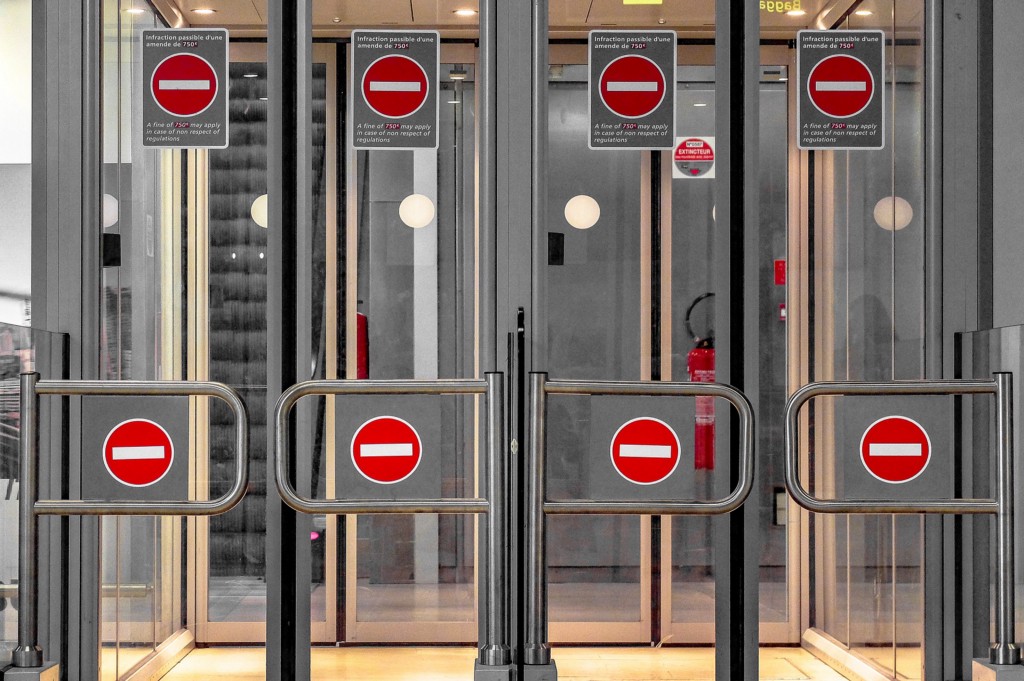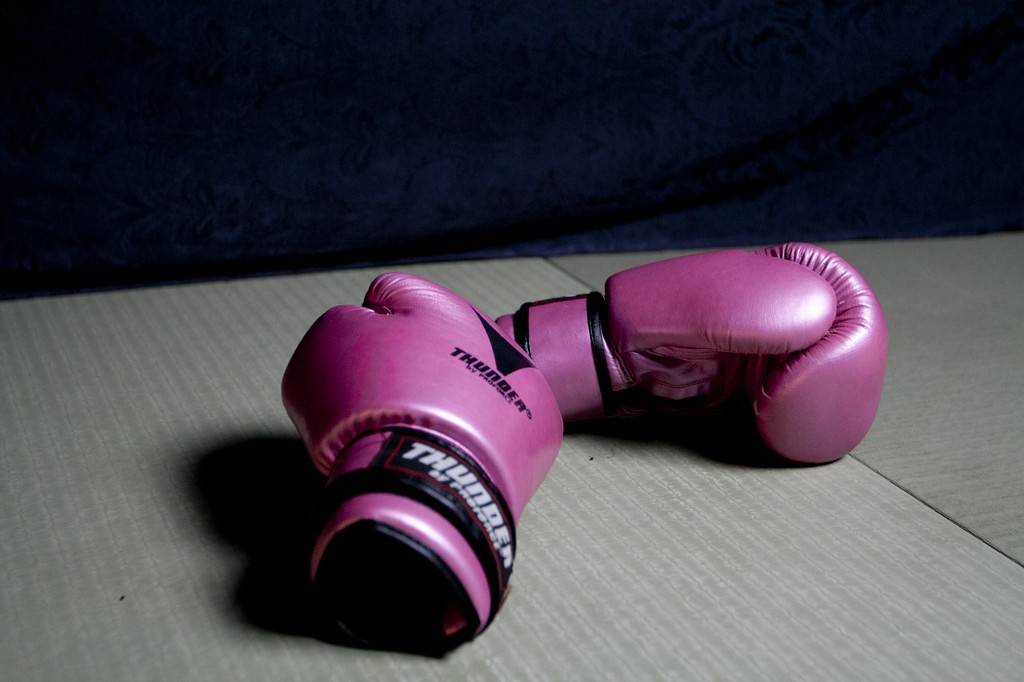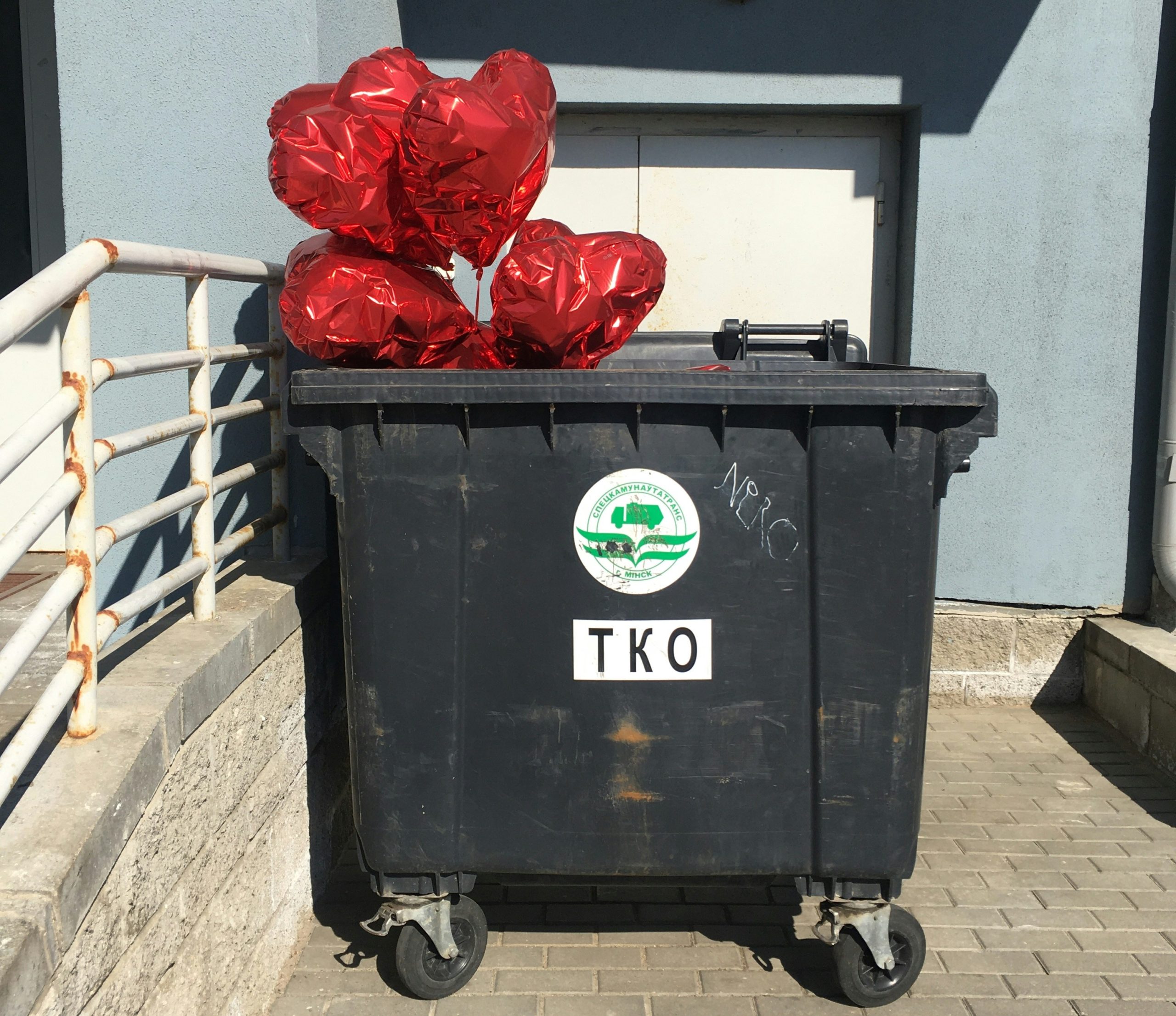Lit Mags
Look at the Woman You Fail to See
Bridgett M. Davis recommends “All the Things You’ll Never Do,” by Camille Acker, a story about a TSA agent and young mother

AN INTRODUCTION BY BRIDGETT M. DAVIS
Once when I was flying somewhere, a TSA agent asked me, as I was hurling my luggage onto the conveyor belt, what products I used on my hair? At that moment, I stopped and took her in, a stylish black woman with brightly polished nails and short, natural hair; we launched into a quick, intense conversation about curl pattern and curling creams, how to keep our hair healthy and hydrated. In those brief moments, I saw her.
 I also saw my own privilege, I who travel enough to be nonchalant about airports and security lines and planes. So much so that I don’t even remember where I was headed that day. I was glad our interaction caused me to stop and connect with her, someone that most people — even myself at times — don’t usually see. This woman is too often unseen not because folks generally tend to look past service employees, but because she’s a black woman. People look past black women all the time, as though we’re invisible. How often, I muse, has someone nearly bumped into me on a sidewalk simply because that someone didn’t see me?
I also saw my own privilege, I who travel enough to be nonchalant about airports and security lines and planes. So much so that I don’t even remember where I was headed that day. I was glad our interaction caused me to stop and connect with her, someone that most people — even myself at times — don’t usually see. This woman is too often unseen not because folks generally tend to look past service employees, but because she’s a black woman. People look past black women all the time, as though we’re invisible. How often, I muse, has someone nearly bumped into me on a sidewalk simply because that someone didn’t see me?
What is so extraordinary about Camille Acker’s compelling debut Training School For Negro Girls is that she demands that we truly see these characters. She reminds us that neither fame, nor ivy-league degrees, nor status, nor racked-up frequent-flyer miles determine our worth. Nothing makes that clearer than spending time with the black girls and women who populate this collection. These are the same ones you’ve likely walked by and ignored, who stood right there in your midst, holding the world down and holding onto dreams kept deep in their chests. Everyone from the high-schoolers on the Metro to the girl helpless over a brother slipping away; from the blunt college-essay-writing applicant to the disappointed 5th grade teacher. Think the naïve gentrifier, the striver who wants a bougie black world to let her in, the adulterous Daddy’s girl.
In this story, “All The Things You’ll Never Do,” Bess is an airport TSA officer straining against her starched uniform to be given respect for once in her life, like the globe-trotting women she encounters in her line of work. “She knew these women had jobs where someone called them Ms., where someone waited for their approval,” the narrator tells us. But having placed so much weight on her need to be seen, Bess suffers for it. In this stunningly bruising story, Acker reminds us that following the rules as they’ve been taught guarantees nothing for black girls, because there’s a different set of rules that apply to them, ones designed to keep these girls neither safe nor free nor seen.
– Bridgett M. Davis
Author of The World According To Fannie Davis: My Mother’s Life In The Detroit Numbers
Look at the Woman You Fail to See
Camille Acker
Share article
“All The Things You’ll Never Do”
by Camille Acker
Bess liked to wear her uniform to Chuck and Billie’s Restaurant and Bar for Long Island Iced Tea Thursdays. She could have changed in those all-automated bathrooms in the airport terminal if she felt like it, so that she wouldn’t have to use the nasty one in the TSA breakroom. She could have just walked in with some tight jeans on and ordered a drink, as if she was just anybody, as if she worked just anywhere.
The lights at C and B’s were turned down so low, people probably could only half see her uniform until somebody opened up the door and let in the early evening light. Nothing like her building at National Airport, with windows that stretched from sidewalk to sun and stone floors shined and buffed to reflect your footsteps.
The woman sitting next to Bess at the bar looked at her badge. “Since 9/11,” Bess told her and leaned in with a smile, “there was almost no more important job.”
“All these attacks now, too? People you wouldn’t believe going out of this city are going through me. And people at the airport can be straight-up nasty. Here they come, complaining about how slow the security line is, wondering why they can’t take their water in with them, asking if they really gotta take off their shoes. And with those full-body scanners? I don’t hear the end of that shit. Go take a bus, I tell them. You know?” New York and Richmond could be reached within four hours. That was far enough.
She signaled to the bartender to set her up another one.
“The other day, I get this bama who can’t find his damn ID. His leg is broken, right, so he’s already taking all his damn time to get to the front of the line. And then, here he is, searching all over, patting down his jacket and shit. Can’t find it though. But, for all that, he’s holding up my line. Inconsiderate, you know? Other people are trying to go places too, see the world and all. He don’t care though.”
Bess took a long sip and set her hand on the scuffed bar. She liked to get her nails done, but she kept them short because no woman who’s going somewhere has nails so long she could scratch somebody just from shaking their damn hand.
“So then I tell him he needs to stand aside, you know, that he’s getting in other people’s way. But he won’t leave. Instead, he starts saying, ‘No, no, I’ve got it, I know I’ve got it.’ Real snooty-like. ‘Just wait,’ he keeps telling me. So, I do, because I’m there to serve people, you know, and he don’t understand that. He thinks I’m there because, you know, it’s like a good time for me on Thursday morning or whatever. But once I decide to go ahead and give him that time, he finally pulls his ID out of you’ll never guess where.”
The woman was still listening, Bess was pretty sure, but she was looking at Bess in the mirror behind the bar. She wasn’t even looking in her face, but this was how people were raised these days, how people thought they could treat you any kind of way. Bess sipped on her drink. She should stop even talking to her, not tell her the punch line. But no, she should hear this story, she should understand just how much life demanded of Bess. This girl probably didn’t know a thing about demands.
“He reaches into his cast, right? His cast. And pulls out this sweaty, bent-up piece of mess. Hands it to me like it ain’t nothing. Proud of himself even. But I got him though, because I wrote on his boarding pass. I got them to search him. I got authority to do that, to make sure people are gonna be safe from sketchiness like that.”
She must not have heard Bess, because she didn’t look as impressed as she should have. Her head did finally start to nod, but real slow, like she couldn’t even understand all the things Bess was talking about, all the things she knew. But then something in her look did change, and Bess sat up straighter in the chair, as straight as she could with those Long Islands starting to weigh her down, and got ready for some respect.
“You go to high school with me?” The woman pushed her bangs to the side and turned toward Bess. She brought her face in close. “Right? Class of ’15?”
And then Bess saw it too: recognition limping into the bar and sitting too damn close, making her uncomfortable.
“Maybe. High school is a long way from the stuff I’m doing now.”
“You was with Rich, right? Didn’t y’all have a baby?” Bess got pregnant their senior year. She didn’t hear the end of her mother’s mouth about it. “Why you go and do that?” she’d asked her over and over.
“Why you working at the airport?” she asked. Now, she wouldn’t stop looking at Bess.
“Where do you work?” Bess asked. She wished for a pen and a boarding pass.
“Human resources for DC government,” she said. Her bangs fell back in her eyes.
“DC government.” Bess let out a laugh.
A lot of the people she graduated high school with were working those same dumb-ass jobs. Just like Rich. Talking about he was going to support them, saying they would get a house. All he was ever going to do was work a DC government job, move up a pay scale, never leave his job, and never have to. No one got fired. Bess didn’t do the exact same shit every day like they did, filling out the same forms, pressing the same damn computer keys in those old-ass buildings. Not her. This girl was hiring other dumb-ass people to work those dumb-ass jobs. Couldn’t waste your life much more than that.
“You get to fly free or something like that?” the girl said. “That’d make working that job worth it. I’d go as many places as I can.”
“I don’t work for the airlines. I work for the federal government. Department of Homeland Security. I don’t just work for some airline.”
“Oh, okay. Well, I guess that’s good.”
“I know it is. I know what I’m doing,” Bess said. She waved for her third Long Island and mean mugged the girl in the mirror behind the bar.
Someone turned the music up and R&B blared out of scratchy-sounding speakers. Bess sang along. She didn’t really know the words, she didn’t even know the name of the song.
She forgot all about her day and all about that girl from high school. Bess didn’t even notice when she left because by then she was slow dragging with the tallest, finest motherfucker in there. She dug the pads of her fingers into the waves he’d probably worn a durag for every chance he got to get them right for the weekend. His back hunched over hers. His slippery smooth words landed on her earlobe. She closed her eyes to catch the tone, not the meaning, and watched the dollar bills suspended from the ceiling sway with the damp heat until the song ended.
Unlike that girl from high school, Bess didn’t work Monday through Friday. But this Friday morning, she wished it was the last day of her week. Her hair was still smoky from cigarettes and her eyes were bleary from all those drinks. Somewhere in the pants pocket of her uniform was her cell phone with the number of the dude she danced with all night. She couldn’t remember his name. She wanted to sleep in and wait for the baby to wake up in another hour. Bess wobbled over to his crib. Her mother said the baby could just sleep in the bed with her, but Bess had wanted to get him something of his own. She hated when people didn’t do right by their kids.
Will was in the Batman pajamas that Bess found in Salvation Army, new with tags still on. He always kicked his blanket off, his dark toes searching for a breeze. It was what his father did, airing just his toes to cool him down. Bess didn’t cover up Rich, he was a man, but she did cover up Will. He, at least, was still her baby. She leaned down and pressed her lips into the pillow of his cheek. The mobile of airplanes suspended from the ceiling turned above him and she gave it an extra push.
One day, she’d have more space: their own apartment, a whole playroom for Will with Batman everything, and a big bedroom so she could keep an ironing board up all the time.
Even on days when she didn’t work, Bess ironed her uniform. She knew to turn the pants inside out because black polyester would get shiny and make you look stupid if you didn’t. She made creases in the legs, spraying the starch on thick and coating not just the pants but the ironing board and her nearby hand. Her mother would buy whatever starch was on sale. Bess didn’t go for that. She bought the expensive starch, one that came in a can with waterfalls and rivers on it. She didn’t know what waterfalls had to do with getting her pants crisp, but that stuff did it every time. Starch went on the shirt too, but she made sure not to put any creases in the sleeves. It made you look corny. Some of the other TSA agents came in looking like that, shirt all crazy with creases and pants halfway wrinkled. They probably didn’t even use the cheap starch. They probably didn’t use starch at all.
You couldn’t be in charge in wrinkled clothes.
“You gonna be late,” her mother said. She leaned on the frame of the doorway. Her hair wrapped and pinned from sleep. She wore the same housedress she had since Bess was a child.
Bess put her finger to her lips and thumbed at the crib. “I’ll be fine,” she said. She went back to ironing the sleeves of her shirt.
“What time you got in?”
“Don’t know, but I needed to relax. When you got authority in a job, you also got stress.”
“Hm.” Her mother pursed her lips like she was about to spit something out. “Been meaning to tell you Rich called, said he could take the baby more, give you time to get used to your new job.”
“He’s not taking Will.”
“Let him be a father.” Time was when her mother hated Rich, said Bess had gotten knocked up by a fool. Now, she acted like Bess was in the wrong.
“He messed that up.” Bess pulled on her pants and zipped them. She put her arms through the still-warm shirtsleeves.
“He got the steadier income. Will could have a room all his own over there.”
“I know what I’m doing.” Bess buttoned her shirt and kissed Will again before she left.
Bess and Vincent got stuck with loading bags in the back for the morning shift. Some people liked being with the checked luggage or behind the scanner, just watching the x-rayed bags roll past. They didn’t want to talk to anyone. Bess wanted to be in the front, checking the boarding passes and IDs. Passengers respected that first person they met more. Some people would look nervous like they were waiting for her to say that they couldn’t go through, or they’d look real close at what she wrote on their boarding pass, worried that she thought they’d done something wrong.
Vincent stopped after picking up the biggest bag so far that morning. He pressed one hand into his over-sized middle-aged belly. He’d been a handler for fifteen years, loading bags, but when the TSA started looking for people willing to take the five-hundred-question government test, he applied. The background checks and running his credit report, they didn’t matter. “An exquisite opportunity,” he told Bess.
She liked that. She hated people who didn’t ever try new shit. Rich never wanted to try anything. Chicken and steak were all he ever ate. He told her he’d had salmon once before, but he’d pronounced it SAL-mon and Bess hadn’t needed much more than that to know she was done. When she left Rich’s place that day, she went to her mother’s house in Northeast. While Will played with his Tonka truck on the kitchen linoleum, Bess took out the TSA information sheet she’d printed at the library and pressed it flat on the table. “I got plans,” she told her mother. “I know it,” her mother said. “But is this plan like the others or is this one going to work?”
Bess wheeled two uprights closer to the large scanning machine and tossed them one by one onto it. Dirty-ass bags. She wiped her hands together, careful to not wipe them on her uniform.
“People just want to complain, talk shit. Like I was telling this know-nothing last night, this lady kept asking me all these questions about the job. You ever get that?” she asked.
“Sure, sometimes. Curiosity is the lust of the mind,” he said.
“Uh-huh. Anyway, I tell this lady last night, bugging me with the questions, if these people trying to fly don’t like it, go take a bus. They don’t check you,” Bess said.
“Buses won’t get you across water,” Vincent said. “And there’s still something about the takeoff of a jet engine, being thirty thousand feet in the air.”
“Yeah?” Bess asked.
“You don’t like flying?”
“Don’t know. Never been on a plane,” Bess said. Vincent got quiet, and Bess felt like she could hear the words like he heard them, and she didn’t think she much liked the sound.
“You want to though? Right?” Vincent stopped loading bags again. “You’ll go to Florida for the new training?”
“Yeah, they paying, I go. And, I mean, I think about flying, you know. I’m not like these people who don’t never want to go anywhere. Went to high school with this girl who hadn’t even been on the Metro. Stayed in her same dumb neighborhood,” Bess said. “That’s not me.” When she’d left Rich and told him his life wasn’t going anywhere, he’d asked where hers was going. And he kept asking while she carried Will and a duffel bag stuffed with their things down five flights of stairs.
“Be careful with those bags,” Vincent said. “Make sure they’re — ”
“I know what I’m doing,” Bess said.
Fridays were the goddamn worst, the business travelers trying to get home for the weekend and the families and couples trying to get away. The afternoons were all the international people, coming for their overnight flights to London and Rome. These women always did it up more than the domestic fliers, more scarves and prettier shoes. Sometimes they wheeled bags Bess had never seen before, not just some plain black roller bags. They had bags in different colors with brand names on them. Or they carried weathered leather bags, big and deep when they reached in for their passports. She knew these women had jobs where someone called them Ms., where someone waited for their approval. Bess marked their papers just like she would mark any of the others. One Ms. stepped up to the stand and gave Bess not one but two pieces of paper. She clicked the pen.
“ID,” Bess said.
“You have it,” she said. Bess thought the accent might be British, or maybe she was supposed to say English. Vincent had given her some history lesson on the difference last week, but he was on break. Bess looked at the papers the woman had. One was the boarding pass and the other was a letter with a crest stamped at the top.
“Ma’am, I need a photo ID. This doesn’t qualify.” Bess held the paper out to Ms.
“My passport was stolen, so I’ve had my embassy declare that I am a citizen and should be allowed on board,” she said. She pulled at the knot in her scarf.
“I don’t think that’s enough to get you on the plane,” Bess said.
“Well, I was told it was.”
Vincent wouldn’t be back from break for another five minutes.
“You can’t just . . . it’s not enough.”
“Do you know that?” she asked. Her nails were short and painted a pale pink. She tapped her fingers on the top of Bess’s stand. Around her wrist was one slim silver bracelet. On her finger was a wedding ring with diamonds all around.
“I know what I’m doing,” Bess said. She gave the woman back her pieces of paper.
“The embassy assured me.”
“I won’t let you through,” Bess said. “You’ll need to move away from the security desk.” She smiled at the next person in line, hoping they would step forward.
“You don’t know what you’re talking about.” “Ma’am, you need to step aside.” Bess motioned for the man at the front of the line, but he still didn’t step up.
Ms. didn’t reply, only draped her other hand over the stand.
“Ma’am, you’re going to have to step aside,” Bess said.
“Sir, come forward.” The man finally neared the stand.
“You’re very disrespectful.”
Ms. moved in front of the man and directly in front of Bess, but Bess leaned away so she could still focus on the man.
“You should be fired for treating someone this way,” Ms. said, her voice just like Bess’s high school teachers when they were trying to embarrass her, trying to let her know that nobody but them was in charge.
“Ma’am.” She tried to reach around to take the documents from the man, to move things along.
“Where is the head TSA person?” the woman asked. “The head TSA person?” Bess asked. She hated people who couldn’t get their sentences together.
“Your supervisor, dear. You don’t know what you’re doing,” Ms. said.
The man who had been waiting behind Ms. lowered his ID, like he wasn’t going to give it to Bess anymore, like she didn’t know how to check him. The people behind him started moving into the other screener lines. One woman shook her head at Bess like she should be ashamed or something. Another looked away when she looked him in the eye, just like that girl from high school being disrespectful, acting like she knew anything about her. She heard someone in line say something about getting a supervisor, just like Ms. wanted.
Ms.’s dark bob swayed with her movements to find someone behind Bess. She removed her hands from the stand and began walking toward one of the scanning lines. On her way, she bumped into Bess’s arm, the sleeve stitched with the Transportation Security Administration patch.
“I haven’t cleared you. You can’t go through there,” Bess said. But the woman didn’t stop, so Bess grabbed at her shoulder.
“Do not do that,” she said, looking over her shoulder only at Bess’s left hand.
Bess didn’t move her hand and the woman tried to keep walking. Her shirt was silk. Bess could tell because she’d gone into one of the shops at National Airport, one where the male business travelers stopped to get their wives something, and fingered a dress in there and the label said “100% silk.” Bess didn’t know if you ironed that with starch. Maybe Ms. always got it dry-cleaned. Maybe she had someone at her house who did those things for her, someone who made her life better and easier because Ms. had already worked so hard and smiled and shaken so many important people’s hands that at the end of the day she couldn’t think about something as small as clothes. Bess hated people who couldn’t do anything for themselves but thought they could do everything. Bess hated people who didn’t know what they were doing.
She grabbed the woman’s other shoulder and began to pull her back. The woman twisted her body and pulled at Bess’s hands, but she would not let go.
“I haven’t cleared you,” Bess said over and over.
Ms. didn’t have the authority that Bess did. She couldn’t just do whatever she wanted. Bess heard the soft rip of the silk and the woman’s shrill “Get off!” right before the commands of two other TSA agents for her to do the same.
Waiting to see someone took hours, but the final meeting with a supervisor so high up Bess hadn’t even seen him yet took only minutes. The woman was important, not just a citizen of the country with the crest emblazoned on their stationary, but a special assistant to the ambassador. It had been the ambassador’s call that ended it for Bess. The TSA didn’t want more bad publicity. The supervisor used words like charges and outraged and disgrace. She hadn’t known the rules at all. He wasn’t sure she’d listened in her training. She should have accepted the paper, and if she wasn’t sure then she should have called a supervisor. When the woman tried to walk through security, Bess should have motioned to the next closest TSA officer to intercept her. Most certainly, she shouldn’t have restrained her as she did. She shouldn’t have torn at her clothes, called her names. Bess hadn’t called her anything, even if she had wanted to. She hated people who lied.
The guards instructed to escort her out asked for the uniform.
“But it’s all I have,” Bess told the men. Still, she loosened the tie and unbuttoned her shirt, the badge weighed down the starched cotton. They stared at her in her black tank top.
Before she walked out, she looked for Vincent. Any evidence of her scuffle with Ms. was gone. The passengers lined up in irritation once again. Vincent checked and scribbled and smiled. She wanted to tell him good-bye, but she didn’t want to yell. She didn’t want to hear her voice amplified over the marble and three-story-high windows. She hated people who didn’t know their place.
It was still early as she drove home, and if she went directly there, her mother would ask if something had happened. If she went and drank some Long Islands without her uniform on, no one at Chuck and Billie’s would know who she was. So, she got out of the 395 tunnel at the first exit and waited at a red light.








